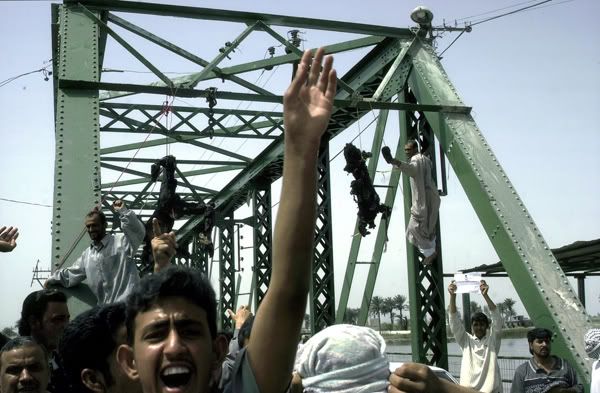MSNBC.com reports:
FBI Director Robert Mueller on Tuesday asked lawmakers to expand the bureau’s ability to obtain records without first asking a judge, and he joined Attorney General Alberto Gonzales in seeking that every temporary provision of the anti-terrorism Patriot Act be renewed.
“Now is not the time for us to be engaging in unilateral disarmament” on the legal weapons now available for fighting terrorism, Gonzales, for his part, told senators.
He said that some of the most controversial provisions of the Patriot Act have proven invaluable in fighting terrorism and aiding other investigations. “It’s important that these authorities remain available,” Gonzales told the Senate Judiciary Committee.
Mueller said sections of the law that allow intelligence and law enforcement agencies to share information are especially important.
“Experience has taught the FBI that there are no neat dividing lines that distinguish criminal, terrorist and foreign intelligence activity,” Mueller said in his prepared testimony.
He also asked Congress to expand the FBI’s administrative subpoena powers, which allow the bureau to obtain records without approval or a judge or grand jury.
"For many years, the FBI has had administrative subpoena authority for investigations of crimes ranging from drug trafficking to health care fraud to child exploitation," he stated. "Yet, when it comes to terrorism investigations, the FBI has no such authority."
15 Provisions at Stake
The Patriot Act is the post-Sept. 11 law that expanded the government’s surveillance and prosecutorial powers against suspected terrorists, their associates and financiers. Most of the law is permanent, but 15 provisions will expire in December unless renewed by Congress.
On the same day Gonzales was speaking to the Senate committee, Sens. Larry Craig, R-Idaho, and Dick Durbin, D-Ill., planned to reintroduce legislation designed to curb major parts of the Patriot Act that they say went too far.
“Cooler heads can now see that the Patriot Act went too far, too fast and that it must be brought back in line with the Constitution,” said Gregory Nojeim, associate director of the American Civil Liberties Union’s Washington legislative office.
The ACLU is part of an unusual coalition of liberal and conservative groups, including the American Conservative Union, that have come together in a joint effort to lobby Congress to repeal key provisions of the Patriot Act.
'Library provision' is controversial
Among the controversial provisions is a section permitting secret warrants for “books, records, papers, documents and other items” from businesses, hospitals and other organizations.
That section is known as the “library provision” by its critics. While it does not specifically mention bookstores or libraries, critics say the government could use it to subpoena library and bookstore records and snoop into the reading habits of innocent Americans.
Gonzales told lawmakers Tuesday the provision has been used 35 times, but never to obtain library, bookstore, medical or gun sale records.
But the criticism has led five states and 375 communities in 43 states to pass anti-Patriot Act resolutions, the ACLU says.
Even some Republicans are concerned. Senate Judiciary Chairman Arlen Specter, R-Pa., has suggested it should be tougher for federal officials to use that provision.
Gonzales already has agreed to two minor changes to the provision, and was expected to support giving someone who receives a secret warrant under the provision the right to consult a lawyer and challenge the warrant in court. He was expected to also back slightly tightening the standard for issuing subpoenas.
Bigger concerns
Neither change addresses the central concern of opponents, which is that it allows the government to seize records of people who are not suspected terrorists or spies.
Critics say the law allows the government to target certain groups, but the Justice Department counters that no Patriot Act-related civil rights abuses have been proven.
Just in case, Craig and Durbin want Congress to curb both expiring and nonexpiring parts of the Patriot Act, including the expiring “library” provision and “sneak and peek” or delayed notification warrants. Those warrants — which will not expire in December — allow federal officials to search suspects’ homes without telling them until later.
The Justice Department said federal prosecutors have asked for 155 such warrants since 2001.
That's just two-tenths of one percent of all search warrants, but their use is growing. The warrants were sought 47 times between the time the law was passed and April of 2003. Since then, it's been invoked 108 times.
Gonzales also notes that the law has been used in non-terrorism cases. For example, federal officials used it to track over the Internet a woman who ultimately confessed to strangling a pregnant woman and cutting the fetus from her womb.
And such searches have been allowed for years in drug and organized crime cases.
Tuesday, April 5, 2005
| [+/-] |
FBI Seeks Expanded Search Powers |
Monday, April 4, 2005
| [+/-] |
2005 Pulitzer Prize Winners - Breaking News Photography |
For a distinguished example of breaking news photography in black and white or color, which may consist of a photograph or photographs, a sequence or an album, Ten thousand dollars ($10,000).
Awarded to the Associated Press Staff for its stunning series of photographs of bloody yearlong combat inside Iraqi cities.
Also nominated as finalists in this category were: Arko Datta of Reuters for his picture that captured a woman’s anguish in the aftermath of the Indian Ocean tsunami, and The Palm Beach Post Staff for its imaginative and panoramic coverage of hurricanes that struck Florida.
A team of Associated Press photographers – including five Iraqis covering the war in their homeland – have won The Pulitzer Prize for breaking news photography. It's the 48th Pulitzer for the world's oldest and largest news cooperative and the 29th awarded for AP photos.
The AP won for a series of graphic and heartbreaking pictures of bloody combat in Iraq. Some of the photos had already won prizes. Many were taken at great personal risk to the photographers, including pictures of gunmen executing Iraqi election workers in the midst of morning traffic, and the charred remains of U.S. contractors who had been killed, dismembered, burned and hung from a bridge in Fallujah.
"These photographers showed extraordinary courage," said AP President and CEO Tom Curley, who celebrated the first Pulitzer AP has won since he became leader of the news cooperative June 1, 2003.
"This is a real testament to the best that AP can be that this prize was won by photographers who came into Iraq on assignment, and five Iraqis who work in the most dangerous place on the earth, to tell the story." said AP Senior Vice President and Executive Editor Kathleen Carroll.
"Their images have a power that will last through history. When we want to look back at what happened in 2004, we'll look at their images."
The photographers cited were Bilal Hussein, Karim Kadim, Brennan Linsley, Jim MacMillan, Samir Mizban, Khalid Mohammed, John B. Moore, Muhammad Muheisen, Anja Niedringhaus, Murad Sezer and Mohammed Uraibi. An unnamed stringer was credited in the photo package for the picture of a daytime execution of vote workers, with the anonymity due to security concerns.
The Iraqi team included Hussein, Kadim, Mizban, Mohammed and Uraibi. The photographers who were on assignment in Iraq were Linsley, from Jerusalem; MacMillan, who is returning to the Philadelphia Daily News from Baghdad; Niedringhaus from Geneva; and Moore, who has since left the AP. All the Iraqi photographers have been recruited, tested and trained on an ongoing basis by the visiting photographers.
The Iraqi photojournalists risked their lives in frequently dangerous situations to get all sides of the story for the AP and to provide readers, listeners and viewers around the world with a level of access to their homeland unmatched by any other news organization.
As a crowd gathered around the photo desk at AP headquarters in New York on Monday, April 4, to hear an announcement, CEO Curley stood atop a chair beside Executive Editor Carroll to congratulate the staff. "They took some extraordinary pictures, they captured some incredible moments in history and they did it in a way that made all of us proud," he said.
Here are abbreviated bios:
Khalid Mohammed, Baghdad, worked with AP for the past two years, spent
significant time in Fallujah and at great personal risk, took the photos of the U.S. contractors killed, then dismembered, burned and their charred remains hung from a bridge. Mohammed said he was threatened immediately after taking the picture and had to escape quickly by car. "I told the driver to keep the engine running, just in case," he said.
Bilal Hussein remained behind in his hometown neighborhood so he could
document the events of the battle for Fallujah, obtaining for AP a stunning and exclusive photo showing Iraqi insurgents firing their weapons. When he was forced to flee to Baghdad, his house – and his cameras – were destroyed in the fighting.
Mohammed Uraibi, Baghdad was hired and trained by AP's visiting
non-Iraqi photographers.
Samir Mizban and Karim Kadim, Baghdad, navigated the hostile areas in the Iraqi capital, including the Sadr City neighborhood.
Jim MacMillan, a Philadelphia Daily News photographer who is wrapping up a one-year assignment for AP in Iraq at the end of April, has been primarily embedded with U.S. forces, and involved in editing the work of Iraqi photographers from the field. Of the Pulitzer notification, MacMillan said he found out when AP Director of Photography Santiago Lyon sent him an instant message saying he should call New York – now.
"I didn't suppose he wanted a call immediately to tell us we lost," MacMillan said.
Brennan Linsley, Jerusalem, was on assignment in central Iraq. On another assignment, he was lightly wounded – scratched by shrapnel.
Muhammed Muheisen, Jerusalem, based in West Bank, was on his first assignment in Iraq.
Murad Sezer, Istanbul, has the versatility to shoot sports, news and feature work, and has been on several tours in Iraq.
Anja Niedringhaus, Geneva-based photographer, has spent many tours in Iraq, and covered the U.S. Marines in their assault on Fallujah.
John B. Moore, who had been based in Cairo, got exclusive access to the U.S. military hospital in Baghdad and took a memorable shot of medics attempting to resuscitate a dying soldier.
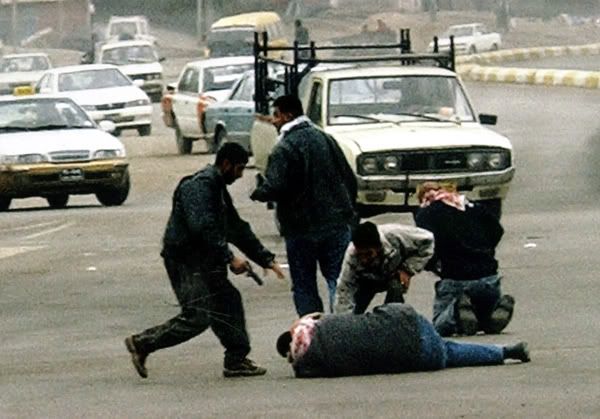 Baghdad - A gunman, left, shoots an Iraqi election worker during an attack on Haifa Street, a base of Sunni Arab insurgents. About 30 men attacked a car carrying five of the workers, executing three at point blank range. (Photo by AP stringer, December 19, 2004)
Baghdad - A gunman, left, shoots an Iraqi election worker during an attack on Haifa Street, a base of Sunni Arab insurgents. About 30 men attacked a car carrying five of the workers, executing three at point blank range. (Photo by AP stringer, December 19, 2004) Baghdad - An Iraqi man celebrates atop a burning U.S. Humvee after an explosion that destroyed a building and set four Humvees on fire, killing at least one U.S. soldier. (Photo by Muhammad Muheisen, April 26, 2004)
Baghdad - An Iraqi man celebrates atop a burning U.S. Humvee after an explosion that destroyed a building and set four Humvees on fire, killing at least one U.S. soldier. (Photo by Muhammad Muheisen, April 26, 2004) Karbala - Moments after a series of bomb blasts on the Muslim day of Ashoura, a youth runs past victims and debris in a busy area of the holy city. (Photo by Brennan Linsley, March 2, 2004)
Karbala - Moments after a series of bomb blasts on the Muslim day of Ashoura, a youth runs past victims and debris in a busy area of the holy city. (Photo by Brennan Linsley, March 2, 2004)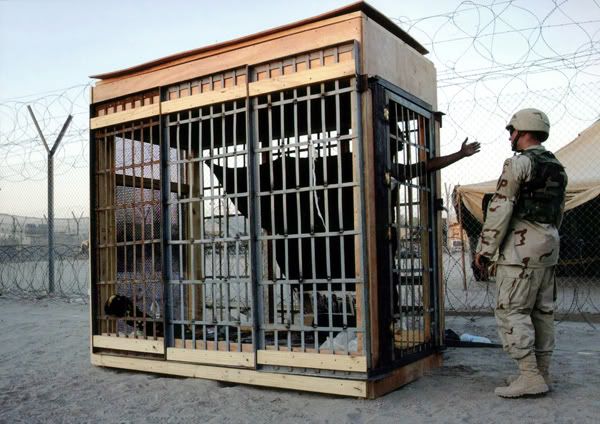 Baghdad - A detainee in a solitary confinement cage talks with a military policeman at Abu Ghraib prison. U.S. soldiers said the prisoner had frequently fought with other inmates. (Photo by John Moore, June 22, 2004)
Baghdad - A detainee in a solitary confinement cage talks with a military policeman at Abu Ghraib prison. U.S. soldiers said the prisoner had frequently fought with other inmates. (Photo by John Moore, June 22, 2004)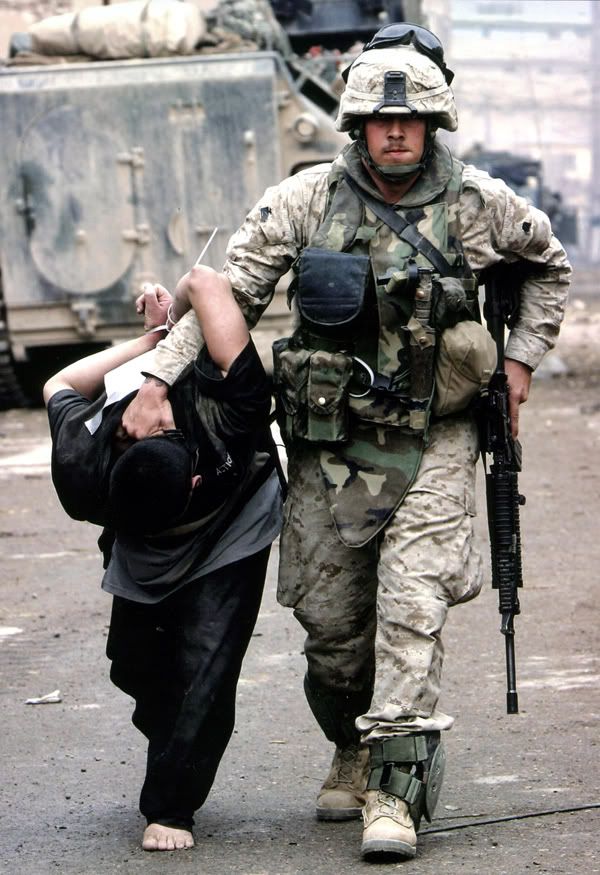 Fallujah - A U.S. Marine leads an Iraqi prisoner during fighting in the center of the city. (Photo by Anja Niedringhaus, November 12, 2004)
Fallujah - A U.S. Marine leads an Iraqi prisoner during fighting in the center of the city. (Photo by Anja Niedringhaus, November 12, 2004) Fallujah - Iraqi insurgents fire a mortar and small arms during the U.S.-led offensive against insurgents in the city. (Photo by Bilal Hussein, November 8, 2004)
Fallujah - Iraqi insurgents fire a mortar and small arms during the U.S.-led offensive against insurgents in the city. (Photo by Bilal Hussein, November 8, 2004)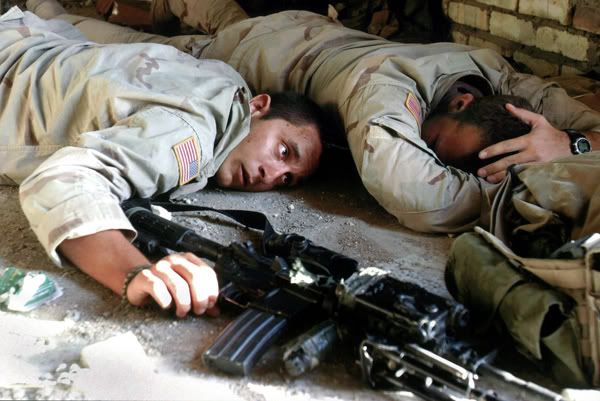 Najaf - U.S. soldiers take cover in a fortified position after a second week of fighting against Shiite militiamen in the holy city. (Photo by Jim MacMillan, August 20. 2004)
Najaf - U.S. soldiers take cover in a fortified position after a second week of fighting against Shiite militiamen in the holy city. (Photo by Jim MacMillan, August 20. 2004) Fallujah - Displaced Iraqi children watch U.S. soldiers while waiting at a checkpoint before returning to their home in Fallujah. (Photo by John Moore, April 27, 2004)
Fallujah - Displaced Iraqi children watch U.S. soldiers while waiting at a checkpoint before returning to their home in Fallujah. (Photo by John Moore, April 27, 2004)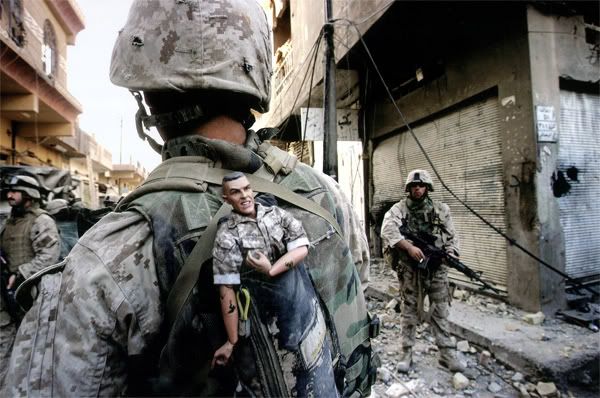 Fallujah - A 1st Division Marine carries a good luck mascot in his backpack as his unit pushed into western neighborhoods of Fallujah. Coalition forces launched a major November offensive for control of the city. (Photo by Anja Niedringhaus, November 14, 2004)
Fallujah - A 1st Division Marine carries a good luck mascot in his backpack as his unit pushed into western neighborhoods of Fallujah. Coalition forces launched a major November offensive for control of the city. (Photo by Anja Niedringhaus, November 14, 2004)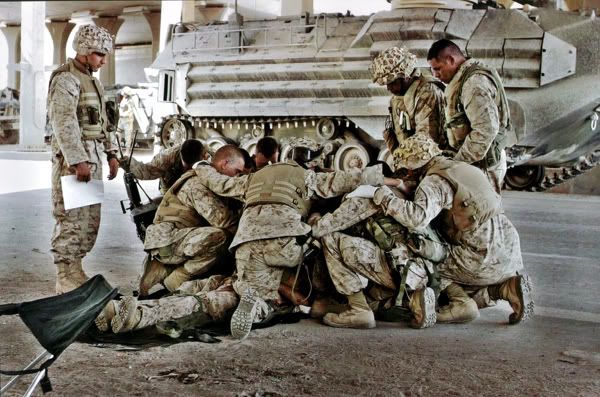 Fallujah - U.S. Marines pray over a fellow Marine killed while fighting insurgent strongholds. (Photo by Murad Sezer, April 8, 2004)
Fallujah - U.S. Marines pray over a fellow Marine killed while fighting insurgent strongholds. (Photo by Murad Sezer, April 8, 2004) Baqouba - At a hospital morgue, relatives mourn the death of Iraqi national guardsman Ryaad Khudayar, one of at least four guardsmen killed in a car bombing at a checkpoint outside Baqouba. (Photo by Khalid Mohammed, August 3, 2004)
Baqouba - At a hospital morgue, relatives mourn the death of Iraqi national guardsman Ryaad Khudayar, one of at least four guardsmen killed in a car bombing at a checkpoint outside Baqouba. (Photo by Khalid Mohammed, August 3, 2004)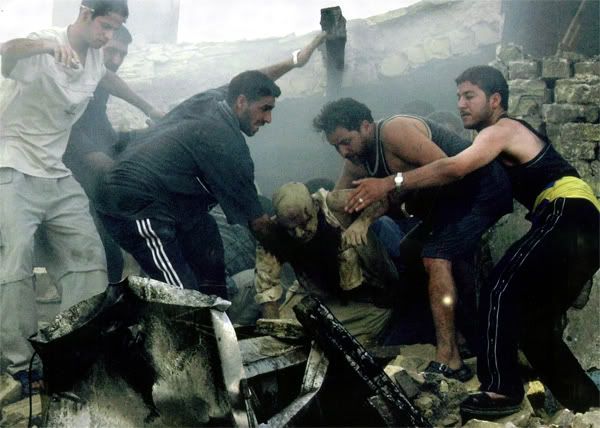 Baghdad - Iraqis rescue a man from the ruins of a building after a car bombing in central Baghdad. At least 10 people were killed, including three foreigners working to rebuild Iraqi power plants. (Photo by Mohammed Uraibi, June 14, 2004)
Baghdad - Iraqis rescue a man from the ruins of a building after a car bombing in central Baghdad. At least 10 people were killed, including three foreigners working to rebuild Iraqi power plants. (Photo by Mohammed Uraibi, June 14, 2004)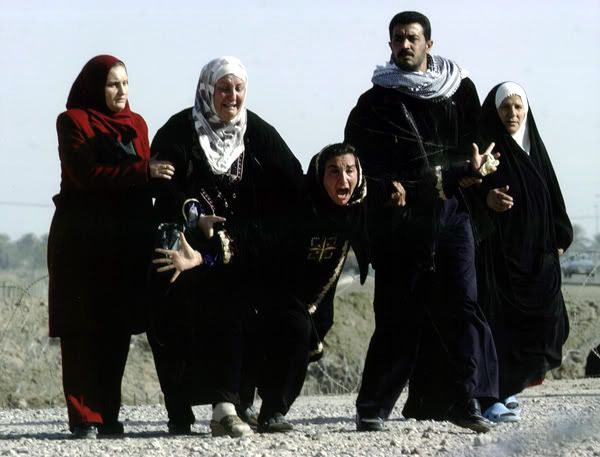 Baghdad - An Iraqi woman reacts as she waits for the release of a family member from Abu Ghrab prison. Hundreds of people waited in frustration for hours, hoping relatives would be among the first detainees freed under a much-publicized amnesty. (Photo by Muhammed Muheisen, January 8, 2004)
Baghdad - An Iraqi woman reacts as she waits for the release of a family member from Abu Ghrab prison. Hundreds of people waited in frustration for hours, hoping relatives would be among the first detainees freed under a much-publicized amnesty. (Photo by Muhammed Muheisen, January 8, 2004)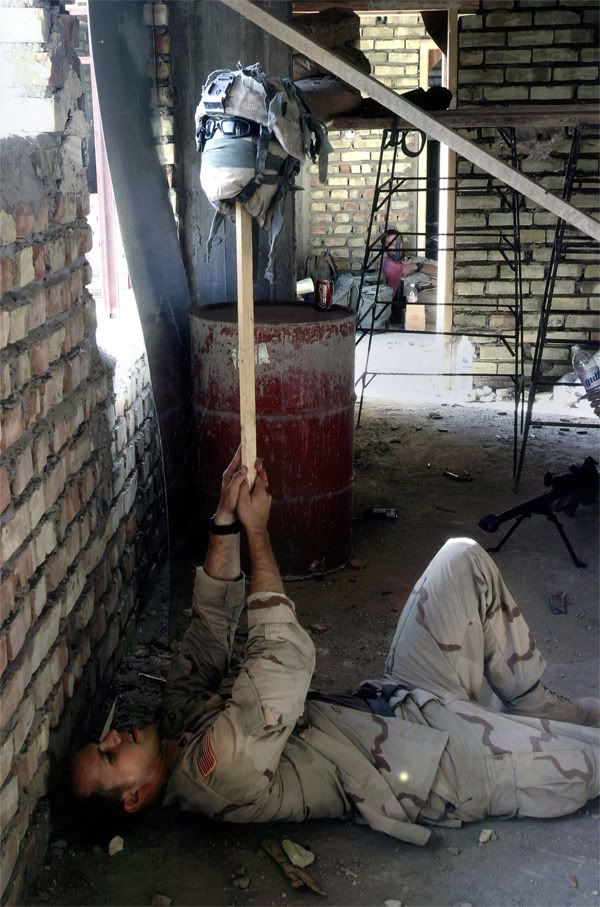 Najaf - A U.S. soldier uses a dummy to draw an insurgent sniper into view. (Photo by Jim MacMillan, August 20, 2004)
Najaf - A U.S. soldier uses a dummy to draw an insurgent sniper into view. (Photo by Jim MacMillan, August 20, 2004)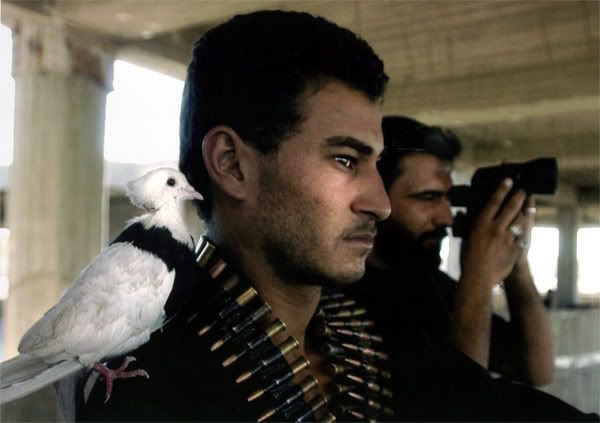 Najaf - A dove sits on the shoulder of a Mahdi Army soldier standing guard near the ancient Imam Ali mosque. The Mahdi Army, a Shiite militia, was fighting U.S.-Iraqi forces for control of the holy city. (Photo by Khalid Mohammed, August 15, 2004)
Najaf - A dove sits on the shoulder of a Mahdi Army soldier standing guard near the ancient Imam Ali mosque. The Mahdi Army, a Shiite militia, was fighting U.S.-Iraqi forces for control of the holy city. (Photo by Khalid Mohammed, August 15, 2004)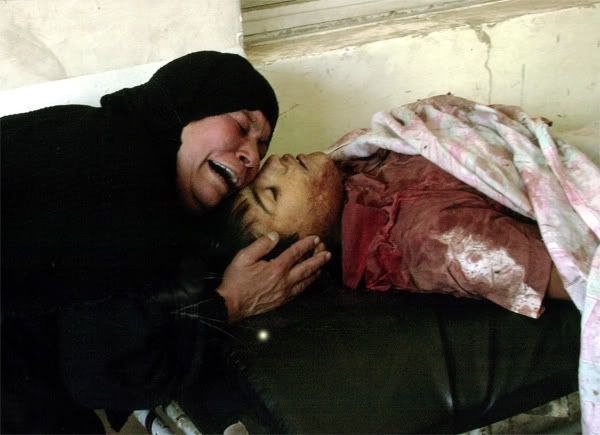 Baghdad - The mother of Samah Hussein grieves over the body at a Baghdad morgue. The boy was among 12 people reportedly killed by a suicide car bombing outside the U.S. military's Camp Cuervo. (Photo by Samir Mizban, June 13, 2004)
Baghdad - The mother of Samah Hussein grieves over the body at a Baghdad morgue. The boy was among 12 people reportedly killed by a suicide car bombing outside the U.S. military's Camp Cuervo. (Photo by Samir Mizban, June 13, 2004)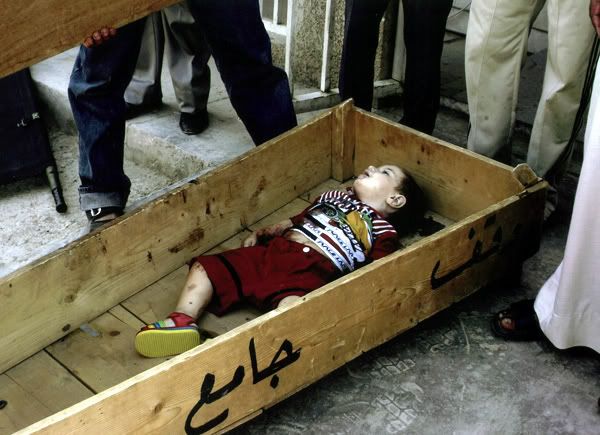 Baghdad - Mohammed Saleem, 18 months, lies in a coffin at a Sadr City morgue. Relatives said the boy and four other family members were killed in their car when U.S. forces opened fire overnight. (Photo by Karim Kadim, June 6, 2004)
Baghdad - Mohammed Saleem, 18 months, lies in a coffin at a Sadr City morgue. Relatives said the boy and four other family members were killed in their car when U.S. forces opened fire overnight. (Photo by Karim Kadim, June 6, 2004)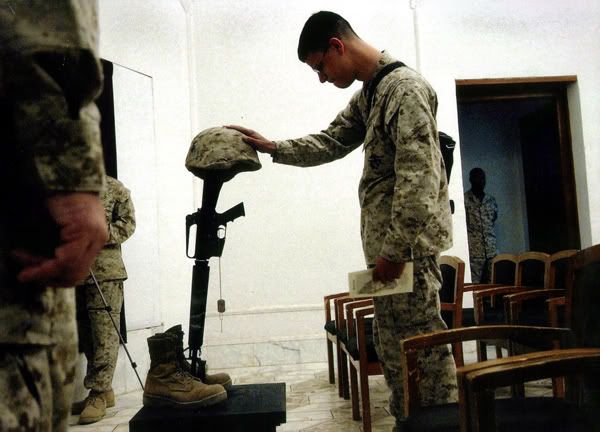 Ramadi - U.S. Marines pay their respects at a memorial service for 1st Marine Division Combat Photographer Cpl. William Salazar, 26, at Camp Blue Diamond. Salazar, of Las Vegas, Nev., was killed in action in Anbar Province. (Photo by Jim MacMillan, October 18, 2004)
Ramadi - U.S. Marines pay their respects at a memorial service for 1st Marine Division Combat Photographer Cpl. William Salazar, 26, at Camp Blue Diamond. Salazar, of Las Vegas, Nev., was killed in action in Anbar Province. (Photo by Jim MacMillan, October 18, 2004)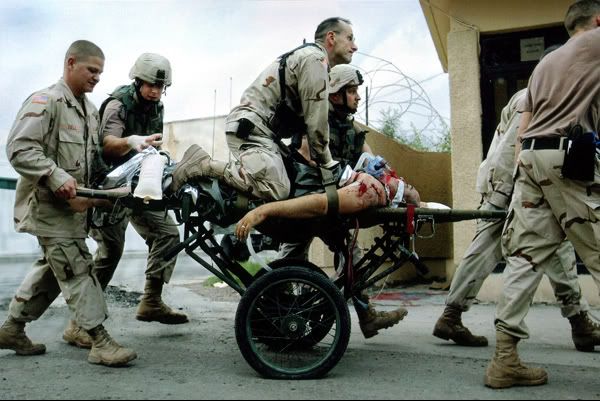 Baghdad - Nurse supervisor Patrick McAndrew kneels over Army Spc. Travis S. Babbit, 24, administering CPR upon arrival at the 31st Combat Support Hospital. Spc. Babbit, of Uvalde, Texas, later died of his wounds. His patrol was attacked in Baghdad by a rocket-propelled grenade and small arms fire, the Pentagon said. (Photo by John Moore, November 9, 2004)
Baghdad - Nurse supervisor Patrick McAndrew kneels over Army Spc. Travis S. Babbit, 24, administering CPR upon arrival at the 31st Combat Support Hospital. Spc. Babbit, of Uvalde, Texas, later died of his wounds. His patrol was attacked in Baghdad by a rocket-propelled grenade and small arms fire, the Pentagon said. (Photo by John Moore, November 9, 2004)